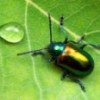
Pheidole dentata, older worker with larva.
A study out in pre-print by Muscedere, Willey, and Traniello in the journal Animal Behaviour finds little support for a long-held idea that worker ants change specializations to perform different types of work as they age. By creating colonies out of different age classes in the ant Pheidole dentata, the researchers showed that older workers were good at pretty much everything, while younger ants performed only a few tasks, but did those less efficiently. Here is the abstract:
Age-related task performance, or temporal polyethism, is a prominent characteristic of labour organization in most social insects. In many species, including almost all ants, young workers perform within-nest tasks such as brood rearing and queen attendance and transition to tasks outside the nest as they age. We examined temporal polyethism in the ant Pheidole dentata by constructing single-age cohort subcolonies and directly determining the ability of young and old minor workers to care for the queen and developing brood. In contrast to the predictions of most temporal polyethism models, larvae reared by old workers gained significantly more mass than those reared by young workers, and did not differ significantly in mass from larvae reared by groups of workers of intermediate age. Additionally, old workers were more responsive to brood care and queen care needs than young workers: old workers approached, cared for and retrieved brood more frequently than young workers, and engaged in more queen-directed behaviours even though young workers tended to remain in closer proximity to the queen. These results do not support the traditional characterization of young workers as a discrete temporal caste specialized to respond to queen and brood needs. Although brood and queen care are performed earlier in development than foraging, older workers retain the ability to perform these tasks and do so with high efficiency. Our study suggests that the apparent specialization of young P. dentata minor workers on nursing may be an artefact of their age-related repertoire expansion and development of task proficiencies.
Source: Muscedere, M. L., Willey, T. A., Traniello, J. F. A. 2009. Age and task efficiency in the ant Pheidole dentata: young minor workers are not specialist nurses. Animal Behaviour, in press, doi:10.1016/j.anbehav.2008.12.018

Just look at industry today the older worker are more productive that newer/younger worker. Why should the ant world be any different.
Sounds obvious. Also, older workers fight in war which is different to humans who use younger ages.
пÑодам ФоÑд-ФокÑÑ 2008 года за 200 ÑÑ. ÑоÑг возможеÑ. ÑÑоÑно!!!
+7 960 200 9209